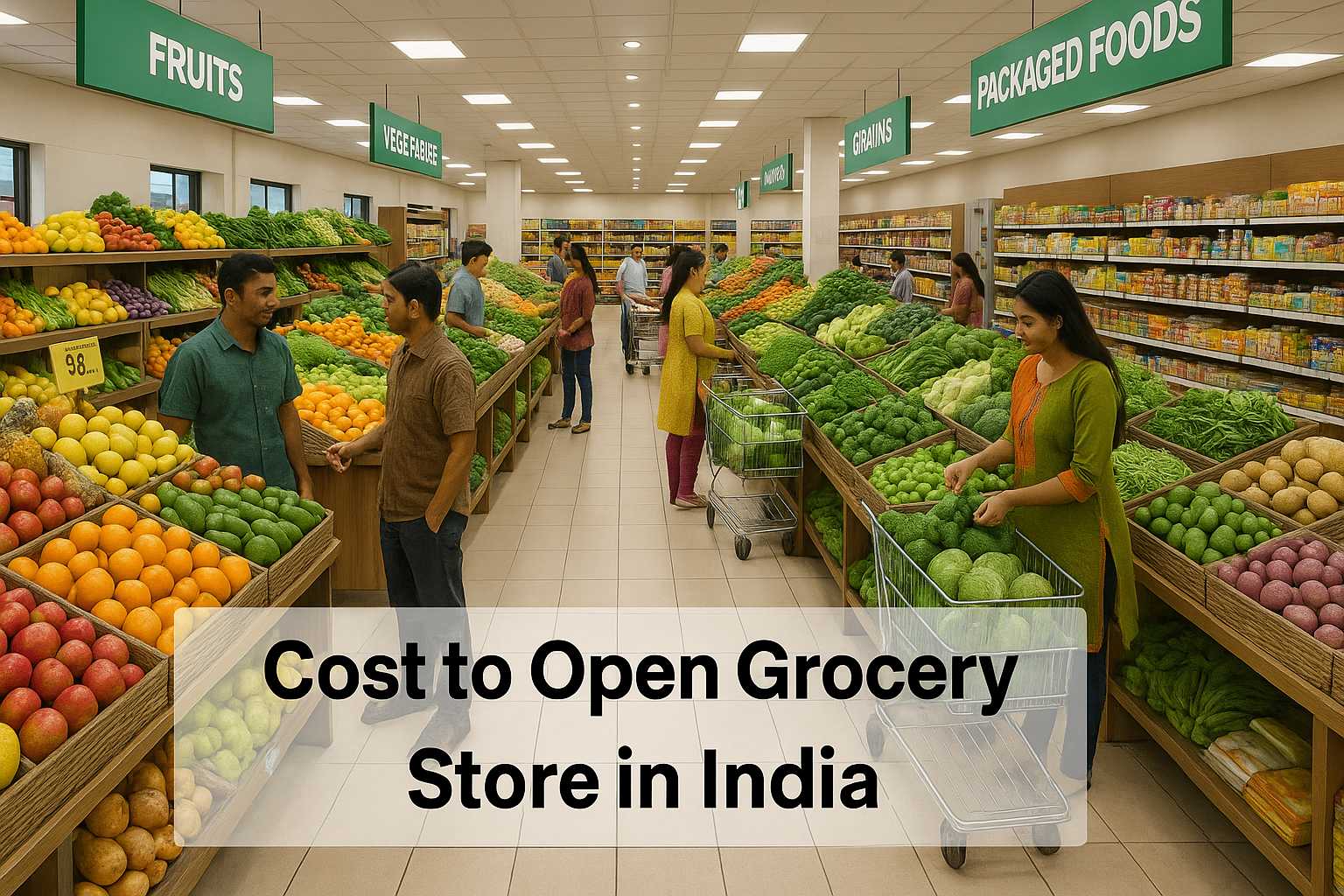Quick Links
ToggleIf you’re planning to open a kirana store or supermarket, one of the first questions on your mind is, how much does it cost to open a grocery store? Setting up a grocery store is a big decision, and understanding the costs involved can help you plan smartly and avoid surprises later. Whether you want to start a small neighborhood shop or a large supermarket, knowing where your money will go, from rent to inventory to technology, can make all the difference. In this blog, we’ll break down the typical cost to open a grocery store, so you can take your first step with confidence and clarity.
Cost Breakdown by Store Type
Thinking about how much investment is required to open a grocery store?
Well, we’ve done the math for you. Below are the numbers that will help you get an idea of the type of investment you will need.
-
Grocery Store
- Initial Investment: ₹3-5 lakhs.
- Rent: ₹10,000-₹50,000/month.
- Inventory: ₹1-3 lakhs.
- Fixtures & Equipment: ₹70,000-₹2 lakhs.
- Licenses & Permits: ₹6,000-₹20,000.
- Marketing: ₹5,000-₹15,000.
- Recurring Costs: Staff salaries (₹7,000-₹20,000/month per employee), utilities, inventory replenishment.
Let’s get into the practical side of things. This is your step-by-step guide to start an online grocery store.
How to Start an Online Grocery Store in India?-
Mini Supermarket (300-800 sq. ft.)
- Initial Investment: ₹10-20 lakhs.
- Rent: ₹20,000-₹50,000/month.
- Inventory: ₹2-7 lakhs.
- Fixtures & Equipment: ₹3-5 lakhs.
- Licenses & Permits: ₹10,000-₹30,000.
- Marketing: ₹50,000-₹1 lakh.
- Recurring Costs: Staff salaries (₹8,000-₹15,000/month per employee), utilities, inventory
-
Full-Scale Supermarket (1,000-5,000 sq. ft.)
- Initial Investment: ₹40-75 lakhs.
- Rent: ₹2.5-6 lakhs/month.
- Inventory: ₹15-20 lakhs.
- Fixtures & Equipment: ₹10 lakhs and above.
- Licenses & Permits: ₹1-2 lakhs.
- Marketing: ₹4-5 lakhs.
- Recurring Costs: Staff salaries (₹10,000-₹20,000/month per employee), utilities, inventory
-
Licensing and Legal Requirements
- Trade License: ₹1,000-₹7,000.
- FSSAI License: ₹5,000-₹10,000.
- GST Registration: Free (consultation fees may apply).
- Additional Permits: Fire safety, shop establishment, etc., depending on location
Key Factors Influencing Store Costs
When it comes to opening a grocery store, the total cost depends on a few important factors. If you find yourself wondering, is opening a grocery store profitable? Understanding these can help you clear the confusion and plan your budget better:
-
Store Size and Format
Your costs will vary a lot based on the type of store you want to open. A small kirana shop will need much less investment compared to a mini supermarket or a full-scale supermarket. Bigger stores mean more space, higher rent, and larger inventory.
-
Location (Urban, Semi-Urban, Rural)
Where you choose to set up your store plays a big role in cost. Urban areas usually have higher rent, electricity, and staffing costs. In semi-urban or rural areas, these expenses are often lower, but foot traffic may also be less.
-
Ownership Model (Independent vs. Franchise)
If you go for a franchise, you might pay extra fees for branding and support, but you get the advantage of an established name. If you choose to open an independent store, you’ll save on franchise fees but need to build your brand and customer base from scratch.
-
Target Customer Base and Product Range
What kind of customers you want to serve and what products you plan to stock will affect your costs. A store selling premium or imported goods will need more investment in inventory than a basic kirana shop focusing on daily essentials.
Tips for Maximizing Profits and Controlling Costs for Your Grocery Store Opening
There’s no way to avoid spending money when starting a new grocery store. But with smart planning, you can keep your costs under control and give your profits a better chance to grow in those crucial first few months.
Here are some tips to help:
-
Utilize Existing Equipment
If you already have shelves, fridges, or counters that are in good condition, use them. This can help you save a lot on setup costs.
-
Base Purchases on Customer Impact
Focus your spending on things that really matter to customers-like clean displays, fresh produce, and easy-to-navigate aisles. Don’t waste money on fancy extras that won’t bring in more sales.
-
Invest in Energy-Efficient Products
Choosing energy-saving lighting, refrigerators, and other appliances can reduce your electricity bills in the long run, helping your store stay profitable.
-
Do Your (Local) Research
Understand your neighborhood’s needs and buying habits. Stock products that people actually want, and avoid filling your shelves with items that won’t sell.
-
Refine Your Staffing Levels
Start with a lean team and increase staff as your customer base grows. This helps keep your labor costs in check while ensuring good service.
-
Make Data-Driven Decisions
Use POS systems and simple reports to track what’s selling and what’s not. This way, you can adjust your inventory, pricing, and promotions based on real numbers, not guesswork.
-
Open an Online Store
Expanding your grocery store with an online option is a smart way to boost profits without the big costs of opening another physical shop. An online store helps you serve local customers who want home delivery or like to check what’s in stock before visiting.
With platforms like Zopping, even if you have no technical skills, you can easily set up and manage your own online grocery store. Zopping’s no-code platform is made for traditional businesses like yours. It helps you list your products, take digital orders, and give your customers a smooth shopping experience. The estimated budget one should have to open a grocery store has been reduced considerably, and it’s a simple, low-cost way to grow your business and stay ahead of the competition.
Your Grocery Business, Digitally Built
From catalog to checkout, manage your store without writing a single line.
Book a Demo


